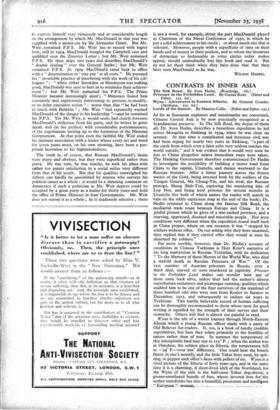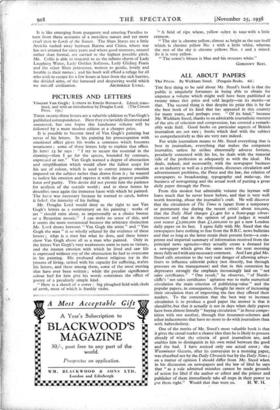CONTRASTS IN INNER ASIA
The Silk Road. By Sven Hedin. (Routiedge. as.) Prisoner in the Forbfdden Land. By Gustav Krist. (Fabet and Faber. zas. 6d.) Wyna : Adventures in Eastern Siberia. By General Gourko. ,(Methuen. -12s. 6d.)
Lords of the Sunset. By Maurice Collis. - (Faber and Faber. 15s.)
:As far as European explorers and missionaries are concerned, Chinese Central Asia is by now practically recognised as a Scandinavian preserve. In The Silk Road, the doyen of them all, Dr. Sven Hedin, describes a hazardous expedition he led across Mongolia to Sinkiang in- 1934, when he was close on seventy. At that time a complicated and ferocious civil...war had been raging for nearly two years in Sinkiang, " a part of
the earth from which even a faint echo very seldom reaches the world outside," and it was evident that k-would very soon be lost to China altogether unless immediate steps were taken. The Nanking Government therefore commissioned Dr Hedin to investigate the possibility of building a motor road from China to the capital, Ununc.hi,, and thence westward to the Russian frontier. After a bitter journey across the frozen wastes of the Gobi, being arrested both by the soldiers of the Tungan General, Ma Chung-Yin, and his rival, the Russian protégé, Sheng Shih-Tsai, exploring the wandering lake of Lop Nor, and being held prisoner for several months in Urumchi (for both of which names the reader will search in vain on the oddly capricious map 'at the end of the book), Dr.
Hedin returned to China along the famous Silk Road, the mediaeval trade route bet4veen. Europe and China. It is a pitiful picture which he gives of a war-racked province, and a starving, oppressed,diseaseci and miserable people. Nor *ere conditions very different when the expedition found itself back in China proper, where on one occasion it was " stopped by soldiers without rifles. On our asking why they were unarmed, they replied that if they carried rifles they would at once be disarmed by robbers." " Far more terrible, however, than Dr. Hedin's account of conditions in Chinese Turkistan is Herr Krises narrative of his long martyrdom in Russian Turkistan, with its dedication " To the Memory of those Heroes of the World War, who died a tenfold death as Russian Prisoners of War." Of the
vast number of Austrian prisoners in Russia, over a third died, starved or were murdered in captivity. Prisoner in the Forbidden Land makes one wonder how any of
them came back alive, unless they had the author's almost superhuman endurance and picaresque cunning, qualities which
enabled him to be one of the four survivors of the trainload of three hundred odd who were sent from Koslov to Saratov in December, 1915, and subsequently to endure six years in Turkistan. This hardly believable record of human suffering can be thoroughly recommended to those whose taste for good writing is- equalled by the strength of their nerves and their stomachs. Others will find it almost too painful to read.
Wyna is the tale of a winter journey through North-Eastern
Siberia which a young Russian officer made with a party of Old Believer fur-traders. It, too, is a book of hardly credible
superlatives; but -here they relate primarily to the hostility of nature rather than of man. In summer the temperature of this inhospitable land may rise to 115° F. ; when the author was at Oimekon, the coldest place in Siberia, the temperature -fell to - 94° F.—over zoo° difference. One could hear the breath freeze in one's nostrils, and the little. Yakut boys used, by wit- ting, to pepper each other's faces with pellets of ice. Wyna-is a vivid picture of the Siberia of forty years ago, and at the same time it is a charming, if short-lived idyll of the Northland, for the Wyna of the title is the half-4:aste Yakut dog-driver, a grease-smothered bundle of furs, whose devoted love for the author transforms her into a beautiful, passionate and intelligent "European,,!. ---- - It is like emerging from purgatory and entering Paradise to turn from these accounts of a merciless nature and yet more cruel men to Lords of the Sunset. The Shan States are a little Arcadia tucked away between Burma and China, where war has not entered for sixty years and where good manners, natural rather than formal, are carried to the highest possible pitch. Mr. Collis is able to transmit to us the infinite charm of Lady Laughing Water, Lady Golden Softness, Lady Gliding Foam and the other Shan princesses, women as gentle, lovely and lovable as their names ; and his book will afford a refuge for all who wish to escape for a few hours at least from the sick hurries, the divided aims, of the harassed and despairing world which















































 Previous page
Previous page